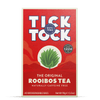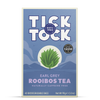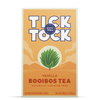Menopause is a natural stage in a woman’s life, bringing hormonal changes that can produce symptoms like hot flushes, mood swings, poor sleep, memory lapses, and shifts in metabolism. To help manage these changes, many women explore natural options alongside healthy lifestyle and dietary habits. One such option is rooibos tea — a naturally caffeine-free herbal infusion from South Africa, appreciated worldwide for its gentle flavour and potential health benefits.

What is Rooibos Tea?
Rooibos (pronounced roy-boss), also called red tea or redbush, is made from the Aspalathus linearis plant, which grows exclusively in South Africa’s Cederberg mountains. Naturally caffeine-free and low in tannins, it’s packed with antioxidants — including aspalathin, a powerful polyphenol found only in rooibos.
With its rich colour and naturally sweet, mellow flavour, rooibos makes a versatile alternative to black or green tea. It can be enjoyed on its own, with a dash of milk, or served cold — and unlike regular teas, it never turns bitter, no matter how long you let it brew.
Naturally caffeine-free, low in tannins and packed with antioxidants.
5 Benefits of Rooibos Tea for Menopause, at a glance
1. Improves Sleep Quality
2. Supports Cardiovascular Health
3. Reduces Inflammation
4. Enhanced Iron Absorption
5. Protects Bone Health
1. Improves Sleep Quality
If menopause is leaving you with restless nights or hot flushes that interrupt your sleep, a comforting cup of rooibos before bed could be just what you need. Caffeine-free rooibos is rich in unique plant compounds like aspalathin and nothofagin, which have been linked to lowering cortisol — the stress hormone that often keeps us alert when we should be winding down.
By helping to reduce cortisol, rooibos encourages relaxation and deeper, more restful sleep, without the stimulating effects of coffee or traditional teas like black tea. And because many women experience heightened anxiety or low mood during menopause, this soothing, full-bodied brew can be a simple, natural way to calm both mind and body.
2. Supports Cardiovascular Health
During menopause, oestrogen (estrogen) levels decline. While this is normal, lower oestrogen can have an impact on heart health. Oestrogen helps regulate cholesterol, so when levels drop, LDL (“bad”) cholesterol often rises and HDL (“good”) cholesterol may fall. This shift can increase the risk of high blood pressure and other cardiovascular concerns.
Rooibos tea may offer gentle support for heart health during this time. Research suggests that compounds in rooibos can inhibit the ACE enzyme, which normally causes blood vessels to tighten. By encouraging blood vessels to relax, rooibos may help maintain healthy blood pressure. Studies also suggest it can support better cholesterol balance by lowering LDL and raising HDL, making it the perfect complement other heart-healthy habits.
3. Reduces Inflammation
Oestrogen also helps regulate inflammation, so when levels drop during menopause, it can lead to bloating, indigestion, or reflux. In fact, Harvard Health reports that up to half of menopausal women experience symptoms similar to GERD.
Rooibos contains powerful antioxidants — especially aspalathin — that lab studies have shown may help calm inflammation in the body. By soothing these inflammatory responses, rooibos could ease digestive discomfort and support gut health during menopause.
4. Enhanced Iron Absorption
During menopause, some women experience changes in their iron levels due to diet or reduced absorption efficiency. However, maintaining adequate iron remains important in midlife for energy, oxygen transport, and overall immunity.
Unlike black or green tea, rooibos is naturally low in tannins — compounds that can interfere with iron absorption. Clinical studies have shown that rooibos has far less impact on iron uptake than regular tea, making it a smart, gentle choice for maintaining healthy iron levels from your diet.
5. Protects Bone Health
Keeping your bones strong is key to staying healthy and active, and getting enough calcium from foods like dairy, leafy greens, and sardines is important at any stage of life.
During menopause, dropping oestrogen levels can speed up bone loss, since this hormone helps your body absorb calcium and maintain bone strength. Lower bone density can make bones thinner, weaker, and more prone to fractures — a condition known as osteoporosis.
Evidence suggests that rooibos, packed with antioxidants, can stimulate mineral formation and be a supportive addition to a calcium-rich diet, helping you take care of your bones while enjoying a comforting cup of tea.

The Bottom Line
Menopause brings hormonal shifts — particularly falling oestrogen — that can impact cardiovascular health, bone strength, digestion, mood, and sleep. Rooibos tea, with its naturally caffeine-free nature and unique antioxidant blend, offers gentle, supportive benefits across these areas.
While rooibos isn’t a substitute for medical care, drinking it daily can be a soothing, informed way to complement other healthy habits during menopause.



